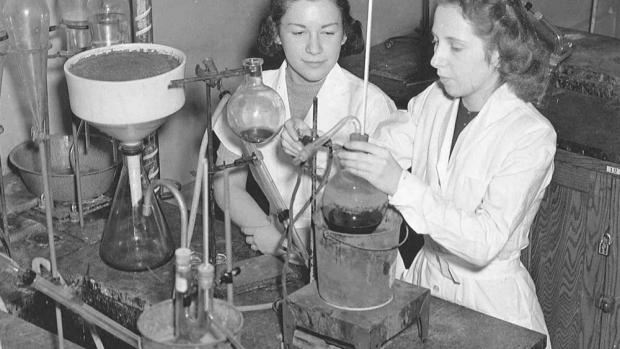Women's History Month: Breaking Through the Gender Barriers in Science and Engineering

NYU-Poly celebrates Women's History Month with a glimpse at the journey of students and faculty at the Institute over the last hundred years.
Women at the Polytechnic Institute of New York University (NYU-Poly) have often found themselves in a curious position.
The Institute was founded in 1854 as a preparatory school for boys; a companion to the Packer Collegiate Institute for girls in Brooklyn Heights. Under this divergent educational system, female attendance at NYU-Poly (then called the Brooklyn Collegiate and Polytechnic Institute) was unfathomable. As Polytechnic evolved from a boys’ prep school into a full technical institute, the doors were never explicitly closed to women, but implicit cultural assumptions about women’s aptitude in science and technology did nothing to encourage female students.
Chipping Away the Barriers
Despite the challenges faced by women who wanted to attend the Insitute, there was a female presence at NYU-Poly long before official coed status was achieved in 1958.
In 1907, Anna Erdmann was awarded a Bachelor of Arts degree, becoming Polytechnic’s first female graduate. Although Erdmann broke new ground, she did not immediately set a new trend. In 1941 the Brooklyn Daily Eagle published a story about Marjorie Wilson—the only female student at the Institute. Over the next few years, Polytechnic experienced an unprecedented rise in female students as women enrolled in science and technology courses to aid the war effort.
By 1943, forty-five women were enrolled in evening session classes. One of these students was Gertrude Elion, who attended graduate courses at night and worked as a lab assistant for Dr. George Hitchings at the Borroughs Wellcome Company during the day. Elion’s dedication to laboratory work yielded important advancements in cancer treatment and immunosuppressive drugs. In 1988 she shared the Nobel Prize in Physiology or Medicine with Hitchings and University of London’s Sir James Black.
During the 1940s, women achieved a degree of tentative acceptance at the predominately male Polytechnic. While they attempted to integrate into academic and extracurricular life, their anomalous position was often publicized. An article in the student newspaper from December 3, 1942 remarked, “Another innovation due to the war was a girl playing trumpet in the orchestra. Despite being a member of the so-called weaker sex, she played right along with the rest of the band and was as good as any of them.” An article from the same month proclaims that in times of peace the sight of “a young woman in the Polytechnic was a cause of much discussion,” but that during the war years this has become a more common occurrence. Despite this, a 1942 profile of Electrical Engineering student Ruby Haykin praises her knitting, cooking, and dancing abilities as much as her aspiration to become a radio technician.
The Next Generation
The official declaration of Polytechnic as a coed institution in 1958 prompted another spike in female attendance. In the year following official coed status, women’s enrollment increased 400 percent. During this time, various women-specific organizations were formed, such as the Women’s Faculty Club and the Society for Women Engineers. By the 1970s, women were actively recruited to the Institute through targeted brochures such as A Woman’s World. While encouraging women to pursue a degree in engineering, A Woman’s World, with its sections on “Career & Marriage” and “Feminine versus Masculine” also revealed the cultural ambivalence towards women in higher education.
Today, women comprise 19 percent of the NYU-Poly student body, similar to the national averages of women in computer science and mathematics occupations (25%) and women in engineering and architecture occupations (13.6 %). Groups like the Society for Women Engineers are active on campus and the Women in Engineering, Science, and Technology (WEST) Event raises awareness of these fields to high school girls. These types of encouragement, as well as the accomplishments of generations of alumnae, serve to influence a new generation of women pursuing careers in engineering, science and technology at NYU-Poly.




